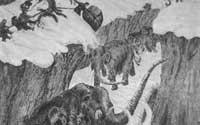Mammoth killed humans
One researcher says that in North America mammoths were lost by the action of hunters and that the same can happen to elephants. Using a computer, Steven Mithen, from the McDonald Archeological Research Institute, Cambridge, has shown that when the number of Stone Age hunters was higher than a critical level, the number of American mammoths decreased dramatically.
Scientists have long discussed what the ghosts lost, trying to decide whether it was the influence of hunters or the influence of climate change. According to some researchers, only mammoths were hunted in some places.
It is known that mammoths were hunted in North America, as arrows appear on the mammoth bodies. Hunting as the main mammoth concealment agent can be an abuse, unless proven otherwise. Mithen's intention has been to demonstrate this and to do so has simulated the influence of hunting on a computer and climate change occurred at the end of the Pleistocene.

To learn how the amount of mammoth affected the climate, Mithen has taken data from the current elephant population. Therefore, it has been taken into account that the elephant and the mammoth are the same size, that they eat similar things and that in droughts they have similar tendencies.
Mithen used different hypotheses. These three hypotheses represented a mammoth volume of 25 million, 50 million and 100 million. On the continent, he considered that initially the human population was 100 people and that growth occurred based on different ratios. He also considered that the number of dead mammoths was proportional to the growth of the human population and that due to intensive hunting, between 0.01 and 10 mammoths were produced per person per year.
For each parameter Mithen calculated the period of disappearance of mammoth.
People appeared in North America and declared that the mammoths disappeared 5,500 years later. Especially when the human population exceeded 12 million, mammoths were hidden in a few decades.





